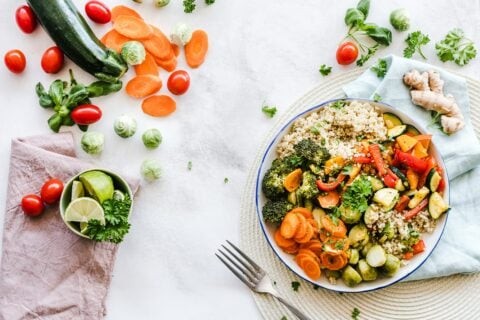Understanding Islamic dietary laws is crucial for anyone interacting with the global Muslim community. With nearly a quarter of the world’s population adhering to Islam, knowing “What Foods Do Muslims Not Eat” is essential for businesses, hosts, and anyone interested in cultural sensitivity. This guide dives into the specifics of haram (forbidden) foods and the principles behind Islamic dietary guidelines.
Islam categorizes food into two main groups: halal (lawful/permissible) and haram (unlawful/forbidden). These classifications are based on the Quran and the teachings of the Prophet Muhammad (peace be upon him), known as Hadith. Beyond these core categories, there are also makrooh (discouraged) and mashbooh (doubtful) classifications that further guide Muslim consumers.
Core Concepts of Islamic Dietary Laws
Before diving into the specifics of prohibited foods, understanding the underlying principles is vital:
- Halal (Permissible): This includes all foods and drinks that are not explicitly prohibited. Halal food must be prepared and processed according to Islamic guidelines, ensuring it’s free from any haram substances.
- Haram (Forbidden): This includes foods and substances explicitly prohibited by the Quran and Sunnah, such as pork, blood, alcohol, and improperly slaughtered animals.
- Makrooh (Discouraged): Foods or actions that are discouraged but not strictly forbidden. Avoiding them is preferred for spiritual and physical well-being.
- Mashbooh (Doubtful): Foods or practices that are unclear regarding their halal or haram status. Muslims are encouraged to avoid these to remain on the safe side.
- Dhabiha (Islamic Slaughter): For meat to be halal, the animal must be slaughtered according to specific Islamic rites (dhabiha). This includes invoking Allah’s name during slaughter and ensuring the animal is treated with respect.
Detailed List of Foods Muslims Cannot Eat (Haram)
The following table provides a detailed breakdown of foods considered haram in Islam:
| Category | Prohibited Items | Explanation | Quran/Hadith References |
|---|---|---|---|
| Pork and Pork Products | Pork, bacon, ham, gelatin (if from pork), lard, etc. | Pork is explicitly forbidden due to its perceived impurity and potential health risks. | Surah Al-Baqarah (2:173), Surah Al-Ma’idah (5:3), Surah Al-An’am (6:145) |
| Carrion (Dead Meat) | Animals that died naturally, from disease, or were not slaughtered according to dhabiha | Consumption of animals not slaughtered according to Islamic rites is prohibited to ensure hygiene and respect. | Surah Al-Baqarah (2:173), Surah Al-Ma’idah (5:3) |
| Blood | Blood and blood-based products | Consuming blood in any form is considered impure. | Surah Al-Baqarah (2:173), Surah Al-Ma’idah (5:3) |
| Alcohol and Intoxicants | Alcoholic beverages, intoxicating drugs | All forms of intoxicants are forbidden to protect mental clarity and spiritual well-being. | Surah Al-Ma’idah (5:90-91), Surah Al-Baqarah (2:219) |
| Improperly Slaughtered Animals | Animals not slaughtered in the name of Allah or slaughtered improperly | Animals must be slaughtered according to dhabiha, invoking Allah’s name. | Surah Al-Ma’idah (5:3) |
| Carnivorous Animals & Birds of Prey | Lions, tigers, eagles, hawks, etc. (animals with fangs or talons) | These animals are considered impure or predatory. | Based on Hadith (Sahih Muslim, no: 1934) |
| Reptiles and Insects | Snakes, lizards, most insects (except locusts) | Generally considered impure, although there are exceptions. | Based on Islamic jurisprudence (Source) |
| Certain Marine Animals | Eels, frogs, shellfish (shrimp, lobster, crab – disputed) | Some scholars consider certain seafood as haram. This is an area of differing opinions among Islamic schools. | Differences in interpretation of Hadith and Islamic texts (Source) |
| Products with Haram Ingredients | Processed foods with gelatin, emulsifiers, additives from haram sources | Any food products containing haram ingredients are also forbidden. | Principle based on Islamic jurisprudence (Source) |


Darura (Necessity): In extreme circumstances where survival depends on it, Muslims are permitted to consume haram food to preserve life. This concept of “Darura” emphasizes that the preservation of life takes precedence over dietary restrictions.
Hidden Haram: Common Food Additives to Watch Out For
Navigating ingredient lists can be challenging. Here are some common additives that may render a product haram:
| Ingredient | Where is it used? | Halal Consideration |
|---|---|---|
| Gelatin | Candies, marshmallows, yogurts, capsules | Must be from halal-slaughtered animals or plant-based. |
| L-Cysteine | Bread products | Source must be confirmed; human or non-halal animal origins are questionable. |
| Mono- and Diglycerides | Emulsifiers in processed foods | Requires source verification; plant-based sources are generally considered halal. |
| Rennet | Cheese-making | Halal only if the calf was slaughtered according to Islamic law. |
| Alcohol | Beverages, flavorings, sauces, baked goods | Any trace of alcohol is considered haram. |
| Carmine | Red dye in cosmetics, candy, drinks | Insect origin typically makes it haram. |
| Enzymes | Food processing | Halal if from halal-slaughtered animals or microbial sources; non-halal animal origins make them haram. |
Finding Halal Food in Non-Muslim Countries
Finding halal food in non-Muslim majority countries is becoming easier due to the growing Muslim population and increasing awareness. Here are some helpful tips:
-
Look for Halal Certification: Seek out products with a recognized halal certification label from a reputable organization. This assures that the food meets Islamic standards.
-
Consider Vegetarian/Vegan Options: Vegetarian and vegan options are often safe choices, but always double-check ingredient labels for any potentially haram ingredients.
-
Read Ingredient Labels Carefully: Always review ingredient labels. Familiarize yourself with potentially haram ingredients and be cautious of vague terms like “natural flavors” or “enzymes.”
The Importance of Halal Certification
Halal certification is a crucial process that ensures food products and consumables meet Islamic dietary guidelines. It covers not only the ingredients but also the processing, packaging, and handling methods to prevent cross-contamination.
Halal certification helps Muslim consumers make informed choices and builds trust in the products they consume. Businesses that obtain halal certification can expand their market reach and cater to the growing global Muslim population. Studies also suggest that consumers are willing to pay a premium for halal-certified products.
Conclusion
Understanding “what foods do Muslims not eat” is paramount for fostering inclusivity and respecting cultural and religious practices. By adhering to these guidelines and being mindful of halal standards, individuals and businesses can create a welcoming and respectful environment for Muslims worldwide.
Frequently Asked Questions (FAQs)
Q1. What are the main categories of food that are considered haram (forbidden) in Islam?
A: The main categories of haram foods include pork and pork products, animals not slaughtered according to Islamic law, blood, alcohol, and any food containing ingredients derived from these sources.
Q2. Is gelatin halal?
A: Gelatin is only halal if it is derived from halal sources, such as fish or animals slaughtered according to Islamic law. Gelatin derived from pork or non-halal animals is haram.
Q3. What should Muslims look for on food labels to ensure products are halal?
A: Muslims should look for a recognized halal certification label on food products. Additionally, they should check for any haram ingredients such as gelatin, alcohol, or lard, and be cautious of ambiguous terms like “natural flavors” or “enzymes.”
Q4. Can Muslims eat meat that has not been slaughtered according to Islamic law if it’s labeled as organic or free-range?
A: No, even if meat is labeled organic or free-range, it must still be slaughtered according to Islamic law (dhabihah) to be considered halal. The method of slaughter is crucial in determining whether meat is permissible.
Q5. Is alcohol in food or cooking permissible in Islam?
A: No, any form of alcohol, whether in beverages, cooking, or as an ingredient in food, is considered haram (not permissible) for Muslims to consume.
Written by Azmi Anees, Edited by Mohammad Abdullah Hussaini (Vice President American Halal Foundation)
References:
Books:
-
Al Quran:
- Surah Al Bakarah
- Surah Al An’am
- Surah Al Maidah
-
Islamic Jurisprudence:
Research:
-
Consumer behaviour towards willingness to pay for Halal products: An assessment of demand for Halal certification in a Muslim country
- October 2018- British Food Journal 121(9)
